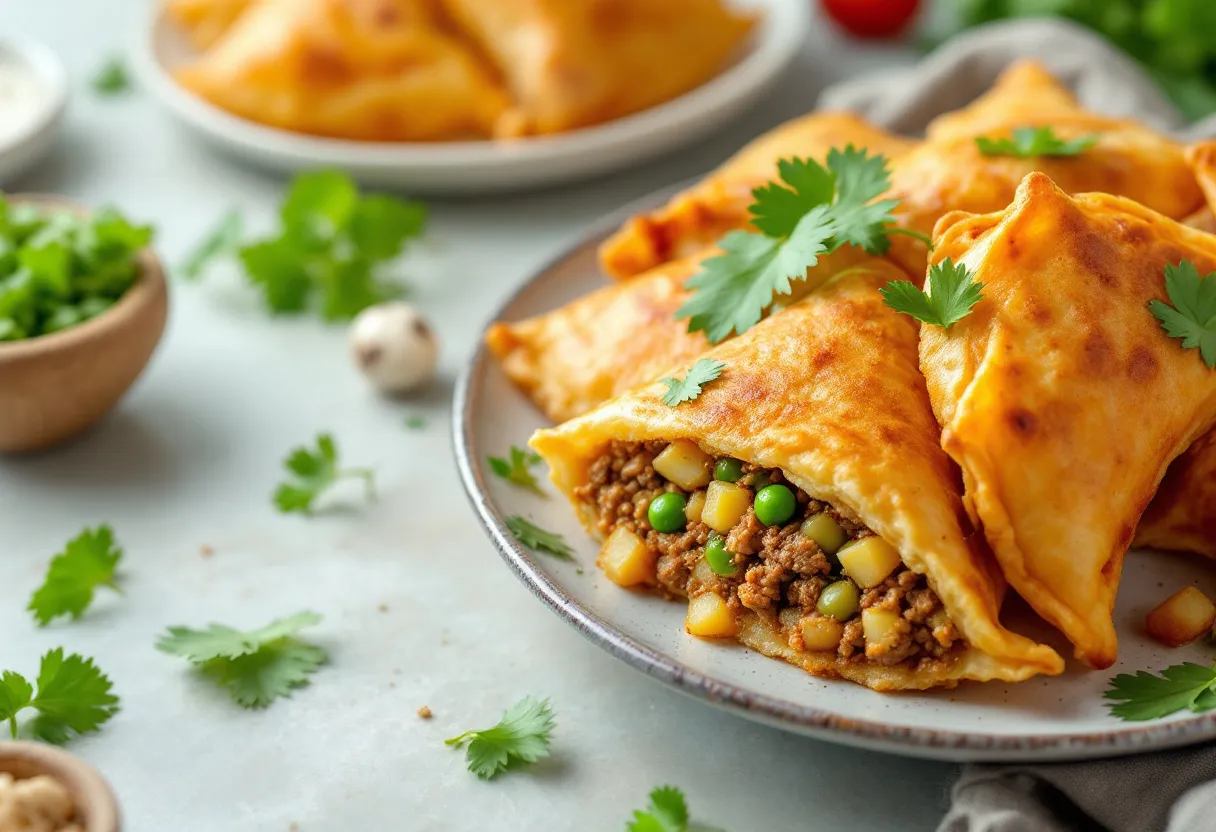Sambusa Qatar Recipe
Sambusa, a delightful and popular snack often enjoyed during special occasions and festivals, is deeply rooted in Middle Eastern and South Asian cuisines. In Qatar, sambusa is a beloved dish characterized by its crispy exterior and flavorful fillings, highlighting its cultural significance and the region's rich culinary heritage. Traditionally prepared with a variety of fillings, sambusa reflects the diverse palates and influences of the Arabian Peninsula, making it a staple in homes and gatherings across Qatar.
History of Sambusa
The origin of sambusa dates back centuries, with its earliest references found in Persian historical texts. Known as "sambosa" in Persian, this scrumptious pastry traveled across trade routes and found its way into the kitchens of the Middle East, Africa, and even the Indian subcontinent. Each region adapted the recipe to include local spices and ingredients, leading to a multitude of sambusa variations. In Qatar, sambusa is closely associated with Ramadan, where they are prepared and shared with family and friends during Iftar, the meal to break the fast.
Ingredients
For this authentic Qatari Sambusa recipe, you will need the following ingredients:
- All-purpose flour for the dough
- Water to mix the dough
- Salt for seasoning
- Vegetable oil for frying and the dough
- Onion, finely chopped
- Ground beef or lamb for the filling
- Cumin powder for a warm spice
- Coriander powder
- Garlic, minced
- Ginger, grated
- Chili powder for heat
- Potato, boiled and mashed
- Green peas for texture and sweetness
- Fresh coriander, chopped for garnish
Preparation
Making the Dough
Begin by combining the all-purpose flour, a pinch of salt, and a tablespoon of vegetable oil in a mixing bowl. Gradually add water while kneading until a smooth and elastic dough forms. Cover the dough with a damp cloth and let it rest for 30 minutes.
Preparing the Filling
Heat a pan over medium heat and add two tablespoons of vegetable oil. Sauté the onion until translucent. Add the ground beef and cook until it browns. Stir in the garlic, ginger, cumin, coriander, and a teaspoon of chili powder. Cook for another minute until the spices become aromatic.
Mix in the mashed potato and green peas. Season with salt to taste. Remove from heat and fold in fresh coriander for a refreshing touch. Let the filling cool to room temperature before handling.
Cooking Process
Assembling the Sambusa
Divide the dough into ten equal portions and roll each into a thin circle. Cut each circle in half to form two semi-circles. Take one semi-circle and form a cone, using a bit of water to seal the edges.
Fill the cone with about a tablespoon of the prepared filling. Seal the open edges using a little more water. Ensure the sambusa is tightly sealed to prevent any filling from leaking during frying.
Frying the Sambusa
In a deep frying pan, heat enough vegetable oil to submerge the sambusas fully. Test the oil's readiness by dropping a small piece of dough into it; it should sizzle and rise to the surface immediately.
Gently slide a few sambusas into the hot oil, being careful not to overcrowd the pan. Fry them until golden brown, which should take about 4-5 minutes. Use a slotted spoon to remove them from the oil and drain on paper towels.
Monitor the frying closely using a cooking timer to ensure even cooking and optimal crispiness.
How to Enjoy Sambusa
Sambusas are best enjoyed hot and crispy, perfect as an appetizer or snack. They can be served with a side of mint yogurt sauce or spicy chutney to complement the rich filling. During Ramadan, they are often the star dish at Iftar, providing a hearty and satisfying start to the evening meal. Pair them with a refreshing glass of Qamardeen, a traditional apricot juice, for an authentic Qatari experience.
Whether you're hosting a Ramadan gathering or simply looking to indulge in a flavorful snack, this sambusa recipe promises to delight your taste buds and offer a taste of Qatar's culinary traditions.
